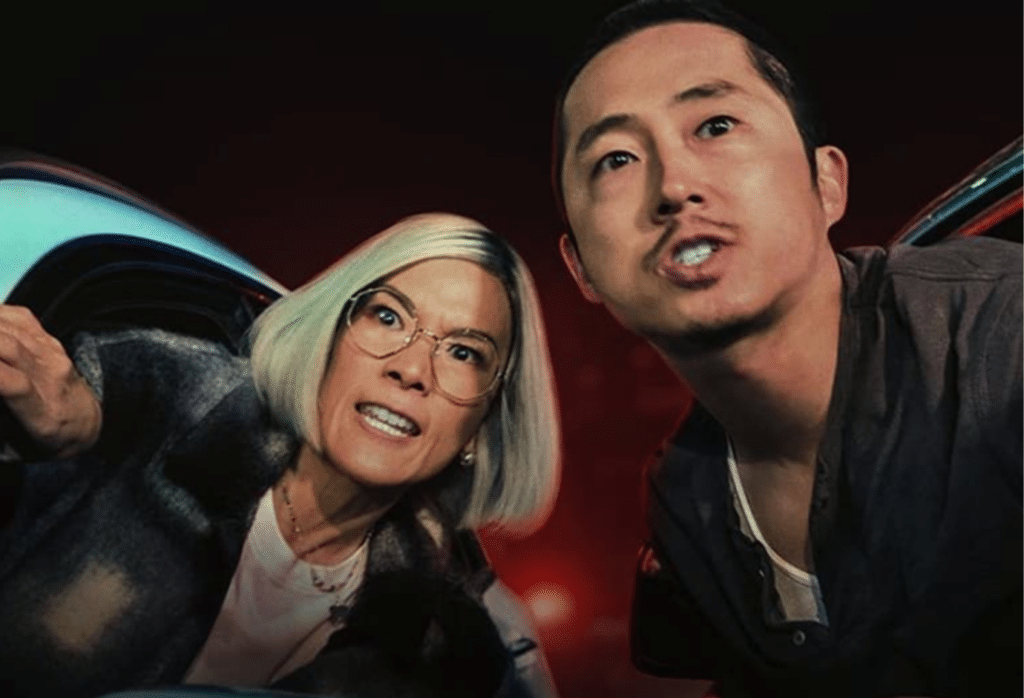If you haven’t already heard, one of the best shows you’ll see this year on Netflix is Beef. Created by Korean American writer and producer Lee Sung Jin, the show follows two Asian Americans (Ali Wong, who plays Amy Lau, and Steven Yeun, who plays Danny Cho) as their lives entangle and fall apart after a road rage incident outside a homewares store in L.A.
However, you may have also heard the controversy surrounding one of the support cast members, David Choe, which is important to note, and which I share more on below.
In the Netflix series Beef, through 30-40 minute episodes, we witness Amy and Danny one-up each other, meddling in each other’s lives in petty, extreme, and at times, violating and violent ways. The series explores a range of contemporary issues, including marriage, immigrant families, trauma and whether a woman ‘can have it all’.
Wong’s character Amy is married to a wealthy son of a deceased Japanese artist, though she has ambitions of her own. She is the founder of Kōyōhaus, a plant boutique you can imagine having a store somewhere like Woollahra or Potts Point. Yeun’s character Danny is less privileged — he’s a struggling handyman, trying to make ends meet with his construction company. Unlike Amy, who is living in a concrete mansion that could easily be featured in Architectural Digest, Danny is living in a hotel with his younger brother, who is aimless and despondent, playing video games and day-trading as a hobby.
The series provides a critic of the American Dream, while also examining the complex class divides that exist in close proximity in a city like Los Angeles.
So why is it so good? For many reasons. But here are five:
The sensitive portrayal of love between under-acknowledged pairs
The series is not afraid to look carefully at the more under-recognised and understated social relationships we share between pairings: we see the deeply thwarted relationship between Danny and his younger brother, Paul (played by Young Mazino), and the broiling antagonism that can exist between ambitious, professional women.
The penultimate episode (episode 9) is one of the most intense episodes of television you’ll watch — one scene between Paul and Danny had me feeling the same emotional grief that I feel when I watch Jack’s death at the end of Titanic.
The final episode had shades of Everything Everywhere All At Once (this series was also produced by A24), as an unlikely scenario clamps our two main characters together in a spiritually revelatory sequence. Amy’s emotional epiphany will hit everyone (especially women, especially mothers) with a gut-punching truth we can all relate to.
The complicated, complex characters
I can’t begin to tell you how wonderful it is to see Asian leads portrayed as the norm in a series where their race is not the thing that makes them special. Wong and Yeun’s characters are both normalised as whole human beings, complex and complicated in all the ways white characters are afforded.
They also get to present a grossly underrepresented version of Asian people on the screen — someone who is wildly insecure, deeply apprehensive about their lives, constantly suppressing some essential selfhood, and committing cycles of self-sabotage in the process.
The gravity of each of their private traumas is sensitively unravelled — for Danny, it’s his need to be the perfect son, the perfect brother, the perfect immigrant child. For Amy, it’s the pressure to be satisfied, to have it all, as a woman, and to find wholesome fulfilment and purpose in being a mother.
When they both reach their limits and find their pursuits implausible, the show elevates these characters to another realm. Towards the later episodes, I felt some spiritual revelation uncoil before my eyes.
Ashley Park, most famous for her role as Mindy alongside Lily Collins in Emily in Paris, also plays a great character in this series. Here, Park is given more to play with, proving she is a much more dynamic and intelligent actor than her role in Emily affords her.
Speaking with Variety earlier this month, show creator, Lee Sung Jin said he was “very proud of all that’s happening in Asian American culture today.”
“But I think especially as a writer, you’re always wanting to lead with character first. Yes, these characters happen to be Asian American, but there’s so much more to them than just that. It really isn’t an act of dodging, but it is more of an actively pursuing character.”
Asians being angry — subverting stereotypes of Asians
So many Asian friends have been telling me about their immense sense of catharsis watching the show. We’re often portrayed as docile, quiet, introverted types with no personality. It’s a harmful, and ludicrous stereotype, which this show completely destroys.
Writer and photographer Ian Kumamoto penned a piece titled Finally, A Show About Angry Asians, echoing a lot of my own thoughts.
“We live in a time when Asians have often been on the receiving end of others’ rage and violence, which finally awakened many of us to stand up, take to the streets and demand better…see, we can get mad, too,” he said, adding that “perhaps anger is what we needed to find our way to each other all along.”
According to Kumamoto , Beef has “created its own community within an Asian cast while also underscoring the importance of human connection on screen. Being a racial minority in any country can be a deeply lonely experience, but sometimes we forget that loneliness is a product of wanting to assimilate into a larger culture that doesn’t serve our interests.”
“Growing up, I saw other Asian Americans as competition, not as community, which only perpetuated my own sense of isolation. When we understand that the people who share our identities are not threats to us, we can unite to become something so big that the culture has no choice but to notice.”
The Soundtrack
We all know the importance of having a killer end-of-a-pilot — it’ll basically make you wanna keep watching or browse for another show.
The ending of Beef’s pilot is probably the best pilot closing of any show, ever. That’s largely thanks to the song that draws the curtain on the episode: Hoobastank’s The Reason.
Remember that song? Circa 2004/05 – it was everywhere. It brought me back to the days of Evanescence, Nickelback, System of a Down, Limp Bizkit. What a cultural moment that was! Remember when Snow Patrol’s Chasing Cars was literally ear-worming its way into EVERY PART OF OUR LIVES? (I fold into a crumbled tofu of total cringe when I hear that song).
I didn’t think Hoobastank’s one-hit wonder had aged well, but the show’s creators pulled a GENUIS move by taking a seemingly melodramatic, cheesy love song, and turning it into the perfect revenge song.
“I’ve found a reason for me / To change who I used to be / A reason to start over new / And the reason is you.”
Anyway, this show was created by millennials, for millennials — you’ll hear The Offspring’s Self Esteem, Sugar Ray’s The Fly, and Paula Cole, I Don’t Want to Wait — made famous thanks to Dawson’s Creek.
The sex
There’s not a heap of sex on this show, but there’s enough sexual tension and desire simmering between characters. Sure, we see some basic, vanilla martial sex, but we also see something we rarely see on TV — two Asians passionately going at it — two Asians enthusiastically desiring each other’s bodies.
**Note** the David Choe controversy
Our utter love for this show in no way reflects any disregard of the latest controversy involving one of the show’s supporting cast: David Choe.
Shortly after the show was released earlier his month, writer Aura Bogado composed a tweet that went viral, bringing back an episode of Choe’s now-defunct podcast DVDASA, where he recounted raping a Black female masseuse.
“David Choe, as in the guy who detailed the way he raped a woman?” Bogado tweeted. “And then came back to say it was just a misunderstood version of his reality? Ok.”
Choe, whose artworks are also displayed at the beginning of each episode’s title card, later rescinded his comments, saying he was just trying at ‘shock humour’. As Vox reported this week, “Netflix, A24, the producers and creator of Beef have not responded to fans’ concerns.”
Obviously, we’re disgusted by Choe’s actions. Our support and love for this show does not reflect how we feel about this controversy. I have always struggled with this moral issue of good art/bad artist (ie. I still love some of Woody Allen’s films, and I want to believe there’s a world where I don’t have to feel bad about this) — but that’s a whole other conversation.
I hope that viewers can appreciate the beauty and genius of Beef while also holding contempt and outrage towards one of its cast members’ past behaviours. Although the more I think about it, the more I’m inclined to side with writer Frankie Huang’s argument that Choe’s involvement in the show “should overshadow how good the show is.”
Which means I shouldn’t have written this gushing review in the first place. But…what do you think?


